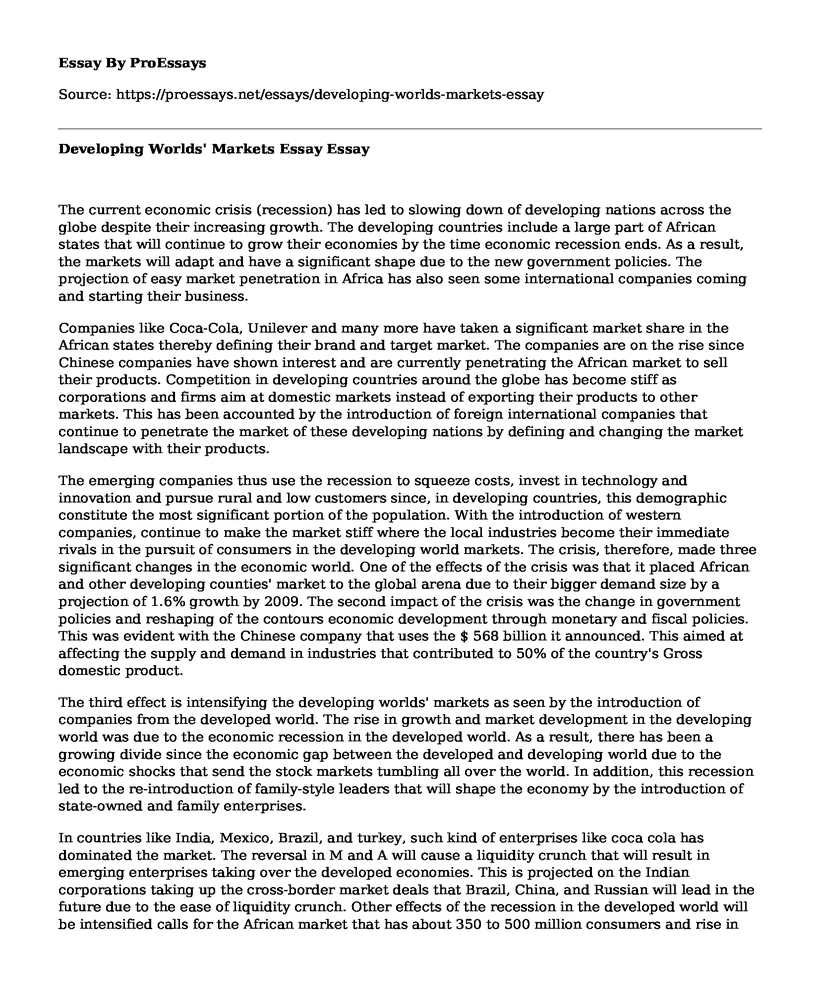The current economic crisis (recession) has led to slowing down of developing nations across the globe despite their increasing growth. The developing countries include a large part of African states that will continue to grow their economies by the time economic recession ends. As a result, the markets will adapt and have a significant shape due to the new government policies. The projection of easy market penetration in Africa has also seen some international companies coming and starting their business.
Companies like Coca-Cola, Unilever and many more have taken a significant market share in the African states thereby defining their brand and target market. The companies are on the rise since Chinese companies have shown interest and are currently penetrating the African market to sell their products. Competition in developing countries around the globe has become stiff as corporations and firms aim at domestic markets instead of exporting their products to other markets. This has been accounted by the introduction of foreign international companies that continue to penetrate the market of these developing nations by defining and changing the market landscape with their products.
The emerging companies thus use the recession to squeeze costs, invest in technology and innovation and pursue rural and low customers since, in developing countries, this demographic constitute the most significant portion of the population. With the introduction of western companies, continue to make the market stiff where the local industries become their immediate rivals in the pursuit of consumers in the developing world markets. The crisis, therefore, made three significant changes in the economic world. One of the effects of the crisis was that it placed African and other developing counties' market to the global arena due to their bigger demand size by a projection of 1.6% growth by 2009. The second impact of the crisis was the change in government policies and reshaping of the contours economic development through monetary and fiscal policies. This was evident with the Chinese company that uses the $ 568 billion it announced. This aimed at affecting the supply and demand in industries that contributed to 50% of the country's Gross domestic product.
The third effect is intensifying the developing worlds' markets as seen by the introduction of companies from the developed world. The rise in growth and market development in the developing world was due to the economic recession in the developed world. As a result, there has been a growing divide since the economic gap between the developed and developing world due to the economic shocks that send the stock markets tumbling all over the world. In addition, this recession led to the re-introduction of family-style leaders that will shape the economy by the introduction of state-owned and family enterprises.
In countries like India, Mexico, Brazil, and turkey, such kind of enterprises like coca cola has dominated the market. The reversal in M and A will cause a liquidity crunch that will result in emerging enterprises taking over the developed economies. This is projected on the Indian corporations taking up the cross-border market deals that Brazil, China, and Russian will lead in the future due to the ease of liquidity crunch. Other effects of the recession in the developed world will be intensified calls for the African market that has about 350 to 500 million consumers and rise in the sustainability stakes.
Cite this page
Developing Worlds' Markets Essay. (2022, May 09). Retrieved from https://proessays.net/essays/developing-worlds-markets-essay
If you are the original author of this essay and no longer wish to have it published on the ProEssays website, please click below to request its removal:
- Essay on the Financial System in the U.S.
- Positive and Negative Impacts of a Reduction in Global Oil Price Paper Example
- Essay Sample on Globalization: A Business Perspective for Growth & Financial Gains
- Foreign Languages Research Proposal: A Key Bridge for Cultural Understanding in an Increasingly Globalized World
- Employees: Essential for Gaining Strategic Advantage in Competitive World - Essay Sample
- Free Essay Example on 14 Principles of Management
- Report on OSHA Alliance Program: Benefits for Employer & Employee Safety & Health







